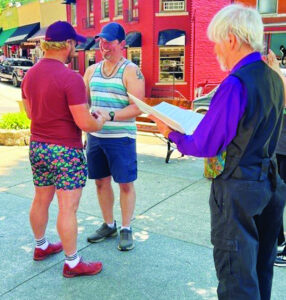It was back-and-forth, sometimes unorganized, and chaotic, but in the end, the Eureka Springs City Council took the first step in establishing a new residential parking district along a part of Spring Street.
At its Nov. 28 regular meeting, the council unanimously approved the first reading of Ordinance 2332, which would establish a permit-only residential parking district for properties along Spring Street from house numbers 211 to 287.
“I just recommend that we pass it this time, so we get this under our belt,” council member Terry McClung said before the vote to pass the ordinance on its first reading after nearly an hour-long discussion on the topic. “I think we can all individually study this some more before our next meeting before we do the second reading.
“I wouldn’t proceed any further than reading one today. We can talk to some others and absolutely we can get comfortable with what we’re trying to do.”
The vote came after council members, along with city attorney Forrest Jacobi, went through the proposed ordinance that was recently updated and submitted by the city’s planning commission.
The ordinance was compared to one also revised and partly rewritten by Jacobi, who repeatedly said the planning commission was unwilling to work with him on authoring a version both parties could agree upon.
“I wish I could work with the planning commission,” Jacobi said during the discussions. “I have attempted to do so. But apparently my duties of city attorney, which … state, specifically, the city attorney shall prepare or supervise the preparation of all ordinances.
“I have not been given the courtesy of having the planning commission follow the municipal code. Now, I’m not an adversary. I would like to see a parking district on Spring Street, but I’d like for it to be done right.”
Council member Harry Meyer said he felt the council needed to base its discussion on the latest version of the proposed ordinance that was drafted by the planning commission.
“I think we’re the legislative body, so if something comes from planning, we get to see it first,” Meyer said. “So, we get to discuss it, and then we can make the changes here, or we can make some changes in the first reading, we can make some changes on the second reading, and we can make changes in the third reading.”
McClung agreed.
“I would like Mr. Jacobi and the planning commission to be on the same page, and if they’re not going to be on the same page, then it’s up to us,” McClung said. “I think we need to look at the [version] the planning commission submitted, because that’s what they want us to look at. We look at it and we make our decisions. And then [Jacobi] can advise us as to what he thinks is good or bad.”
Jacobi’s main issues with the planning commission’s proposal involve the enforcement of fines and penalties in the proposed district. He also isn’t in favor of using hang tags for permit holders, instead saying stickers are the best choice.
“I rewrote this ordinance that I proposed two weeks ago to make it clearer, identifiable, enforceable, and so forth,” Jacobi said. “This ordinance that I produced today, that’s the altered version. I’m not even saying that the council should pass it. I’m just saying that this is an enforceable ordinance that the city council can look at. And they can certainly look at the planning commission amended ordinance, and we can discuss the differences between the two groups.”
Council member Melissa Greene asked: “So, my question is, has the planning commission seen the new rewrite, Forrest?”
“No, but they don’t seem interested in what I rewrite,” the city attorney responded. “So, since they don’t send me their ordinances, I don’t send them mine.”
A motion was then made to assign the planning commission’s version of the proposed ordinance a number and have its first reading.
However, once city clerk treasurer Ann Armstrong started reading the proposed ordinance, she was cut off by planning commission chair Ann Tandy-Sallee, who was sitting in the audience, saying that the proposed ordinance being read wasn’t the latest version from the commission.
Eventually, after a bit of confusion, the planning commission;s latest version was read, including exhibits that laid out specifics including the rules and fines associated with the proposed parking district.
“I just wanted to remind everybody that this is a test run for Eureka,” council member Autumn Slane said. “We’re trying to fix this one street so we can see if that works for everybody else.”
Two motions were approved during the discussions.
One was a motion approving the use of stickers for property owners in the parking district and the use of hang tags for guests. The proposed ordinance calls for the police department to oversee the issuance of the permits.
“How do you give a guest a permit if it’s not a hang tag?” Meyer asked.
The second vote removed language regarding the penalties for violations of the proposed ordinance, something that Jacobi encouraged removing.
“It’s unenforceable,” Jacobi said. “It is absolutely unenforceable. The city code follows the state code. You cannot alter the state code when it says all ordinances or resolution, therefore in conflict herewith are hereby repealed to the extent of such conflict. This would, in essence, repeal the city’s ability to register any kind of traffic violations or otherwise.”
Police already use their judgment when enforcing traffic violations, the council was told.
“This [proposed ordinance] has … a fine of $70 per violation,” Jacobi said. “There’s nothing in the city code that allows that. In fact, there are no specified prices in the city ordinance and the city code. If you put this in here and say all ordinances and resolutions or parts thereof in conflict herewith are hereby repealed, you’ve just repealed all of the parking and traffic ordinances in the city of Eureka Springs.”
Meyer responded: “It says an ordinance to establish a Spring Street residential parking district. So, every bit of this ordinance is applicable to that parking district. So … we can say at the end that this is only for the parking district on Spring Street and then we’re not repealing anything else.”
Tandy-Sallee reminded the council that the language used in the proposed ordinance was approved after many workshops that included council members and members of the planning commission. Some workshops were also attended by Jacobi and police chief Brian Young.
“We had numerous workshops, and this was language that we all agreed upon,” Tandy-Sallee said “And Mr. Jacobi, when we met and you wanted this to be taken out, I made it clear that I was uncomfortable taking it out because we as a group came up with that language.
“What the city council decides to do at this point is up to the city council, but I’m not going to remove language when as a team we all agreed upon it. That’s the reason it’s still there. I’m sorry that you don’t like it, but that’s what the team had decided upon.”
In the end, the council approved the first reading and committed to study the issue further before the next council meeting, scheduled for Dec. 12.
“I think we have to put a little blind faith in our residents [of Springs Street] that they’re going to follow this [ordinance if it’s passed],” McClung said. “It’s to their benefit. And if they don’t do it and it falls apart, then they’ll lose it.
“If they don’t respect what we’re trying to do here … we’ll go back and let everybody park where they can, it’s that simple. We can only do so much. We’re limited in that respect.”
In other council action, quick approvals were granted for new food truck lottery applicants and the third quarter financial summary report.



